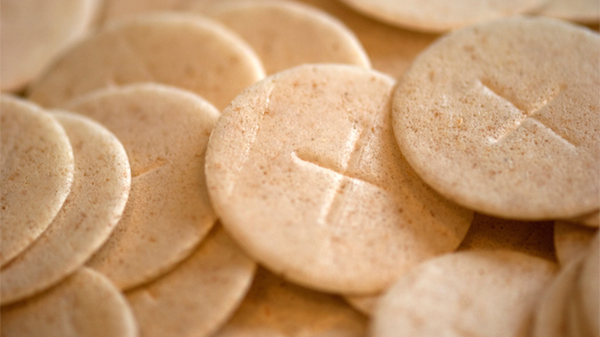Repost: Dear Miss Lawrence
An updated version of an earlier post, Bringing the best out in men, was published a few days ago on the Goretti Group website:
"We are travellers…not yet in our native land" – St. Augustine
An updated version of an earlier post, Bringing the best out in men, was published a few days ago on the Goretti Group website:
Seventh Day Adventists (SDAs) believe that Christians shouldn’t worship on Sundays and that the Saturday Sabbath is still in effect. In recent weeks I’ve been having a discussion in a Seventh Day Adventist in response to my post Why do Christians worship on Sundays? The exchange has been good and I think it’s well worth a read and I’d invite you to check it out.

I haven’t had much interaction with SDAs before and I hope to do some posts looking at their more interesting doctrinal positions, of which there are quite a few. However, in preparation for this, today I would simply like to do a post where I catalogue all the places in the New Testament where Sunday is mentioned:
1. The Resurrection
All the Gospels record the Resurrection taking place on Sunday (Matthew 28:1-7; Mark 16:2, 9; Luke 24:1; John 20:1).
2. Resurrection Appearances
Jesus appears to His disciples on Sundays (John 20:19, John 20:26).
3. Pentecost
The original Pentecost took place on a Sunday (Lev. 23:16) and therefore so did Pentecost in the New Testament (Acts 2:1). On this day the first sermon is preached, three thousand convert and are baptized.
4. Preaching and celebrating the Eucharist
In Paul’s travels, it is recorded that the Christian community came together to hear Paul preach and break bread (Acts 20:7).
5. Gathered collections
Paul instructed the Corinthians to gather their charitable donations on Sunday (1 Corinthians 16:2).
6. Vision of Heavenly Worship
Jesus gave the apostle John the vision of Revelation on the first day of the week (Revelation 1:10).

This month in the United States we celebrate Thanksgiving, so I thought it was a good time to do a post where I celebrate the top five things Americans say (or don’t say) which make me me raise my eyebrows, tut slightly and set about making myself a comforting a cup of tea 🙂

In my previous post, I recounted a little bit of my own story and how I came to reconsider the Catholic teaching concerning intercommunion. In today’s post I would like to present the two main issues around which this teaching revolves.


Reception of the Holy Eucharist has recently been the subject of scrutiny in the media, prompted by some of the discussions taking place in the “Synod on the Family”. In my own life, Holy Communion was also the subject of a recent incident concerning a friend of mine.
You see, a friend recently went to a Catholic conference together with a Protestant. Being a Catholic event, there was, of course, the celebration of the Eucharist. When time for Mass came, the non-Catholic was upset that she couldn’t go up to receive the Eucharist. She couldn’t do this because, under ordinary circumstances, the Catholic Church does not allow non-Catholics to receive Holy Communion.
“…members of those churches with whom we are not yet fully united are ordinarily not admitted to Communion”
– United States Conference of Catholic Bishops, “Guidelines For communion”
In this post I would like to provide a summary of what I say when I’m asked why it is that the Catholic Church doesn’t allow anyone to receive Holy Communion (the Eastern Orthodox Churches have similar rules for similar reasons). As usual, this won’t be an exhaustive theological explanation, simply a rough outline of the kind of thing I personally say when I’m asked to explain this particular Catholic teaching.

Recently, a clerical friend of mine was officially installed at a parish here in San Diego. It called to mind the invitation of Jesus to His Apostles:
“Follow me and I will make you become fishers of men” – Mark 1:17
I remember being in primary school and, upon hearing the phrase “fishers of men”, had fantastical pictures in my head of St. Peter and Andrew dragging ashore nets full of squirming bodies of fully-grown men. What can I say? I had a vivid imagination as a child.

There’s a lot of discussion online at the moment about the conditions under which people may or may not receive communion. I have another post in draft on this subject, but I wanted to do a quick post outlining some of the earliest Church testimony on this subject.
In the First Century, the Didache teaches the following:
“On the Lord’s day, gather yourselves together and break bread, give thanks, but first confess your sins so that your sacrifice may be pure. However, let no one who is at odds with his brother come together with you, until he has reconciled, so that your sacrifice may not be profaned.” – Didache (Chapter 14)
So here we see that unrepentant sin or in a state of disunity cannot receive communion. We find Justin Martyr in the Second Century saying something very similar:
“This food we call Eukaristia [the Eucharist], and no one is allowed to partake but he who believes that our doctrines are true, who has been washed with the washing for the remission of sins and rebirth, and who is living as Christ has enjoined” – St. Justin Martyr, First Apology (Chapter 66)
Here we find the three basic conditions to receiving communion: baptized, assent to Church doctrine and right living.

I’ve got a more substantial post in the works on the subject of interdenominational communion which I’ll publish next week…